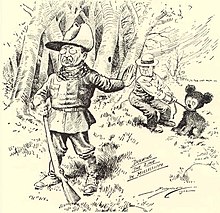Clifford K. Berryman

Clifford K. Berryman (April 2, 1869 – December 11, 1949)[1] was a Pulitzer Prize winning cartoonist with the Washington Star newspaper from 1907-1949. He was also a cartoonist for the Washington Post from 1891-1907.
Life & Career
Berryman was born on April 2, 1869 in Clifton, Kentucky to James Thomas Berryman and Sallie Church Berryman.[1] His father, James, often entertained friends and neighbors with drawings of "hillbillies" from their hometown. Clifford inherited his father's knack for drawing and was appointed draftsman to the United States Patent Office in Washington, D.C. from 1886-1891. During his tenure, Berryman submitted sketches to the Washington Post and in 1891 he became an understudy of the Post's political cartoonist, George Y. Coffin. After Coffin died in 1896, Berryman fulfilled the Post's cartoonist position until 1907, at which time he was hired by the Washington Star. He continued to draw political cartoons for the Star until this death in 1949.[2]
During his career, Berryman drew thousands of cartoons commenting on American Presidents and politics. Presidential figures included former Presidents Theodore Roosevelt, Franklin D. Roosevelt, and Harry S. Truman. The cartoons satirized both Democrats and Republics and covered topics such as drought, farm relief, and food prices; representation of the District of Columbia in Congress; labor strikes and legislation; campaigning and elections; political patronage; European coronations; the America's Cup; and the Atomic Bomb. Berryman was a well prominent figure in Washington, DC and President Harry S. Truman once told him,"You are ageless and timeless. Presidents, senators, and even Supreme Court justices come and go, but the Monument and Berryman stand."[3] Berryman's cartoons can be found at the Library of Congress, National Archives, George Washington University, as well as archives that house presidential collections.[4]
Berryman married Kate Geddes Durfee in July, 1893 and they had three children: Mary Belle (died as an infant), Florence Seville (an art critic), and James Thomas (a Pulitzer-Prize winning cartoonist). Berryman was an active member of the Washington Heights Presbyterian Church. He was also the first cartoonist member of the Gridiron Club and served as the president in 1926.[5]

The teddy bear
In a 1902 cartoon, Berryman depicted President Theodore Roosevelt showing compassion for a small bear cub. The cartoon inspired New York store owner Morris Michtom to create a new toy and call it the teddy bear.[6]
Pulitzer prize
In 1944, Berryman was awarded the Pulitzer Prize for Editorial Cartooning for his drawing "Where is the Boat Going."[7]
References
- ^ a b Clifford K. Berryman
- ^ http://www.gwu.edu/gelman/spec/ead/ms2024.xml
- ^ http://www.washingtonpost.com/wp-dyn/content/article/2008/02/02/AR2008020202086_2.html
- ^ http://www.gwu.edu/gelman/spec/ead/ms2024.xml
- ^ http://www.gwu.edu/gelman/spec/ead/ms2024.xml
- ^ True story of the Teddy Bear by The Theodore Roosevelt Association
- ^ Search Results
Gallery
-
A signed 1904 photo Theodore Roosevelt to CK Berryman
-
A cartoon of William Jennings Bryan reading news from war fronts 1914
-
A comedic representation of the debate about the income tax in the United States
-
The "lame ducks" represented in this picture are defeated Democrats heading to the White House hoping to secure political appointments from President Woodrow Wilson.
External links
- Berryman Family Papers at the Smithsonian's Archives of American Art
- Berryman cartoons at The Almanac of Theodore Roosevelt
- Clifford K. Berryman Digital Collection, Special Collections Research Center, Estelle and Melvin Gelman Library, The George Washington University




